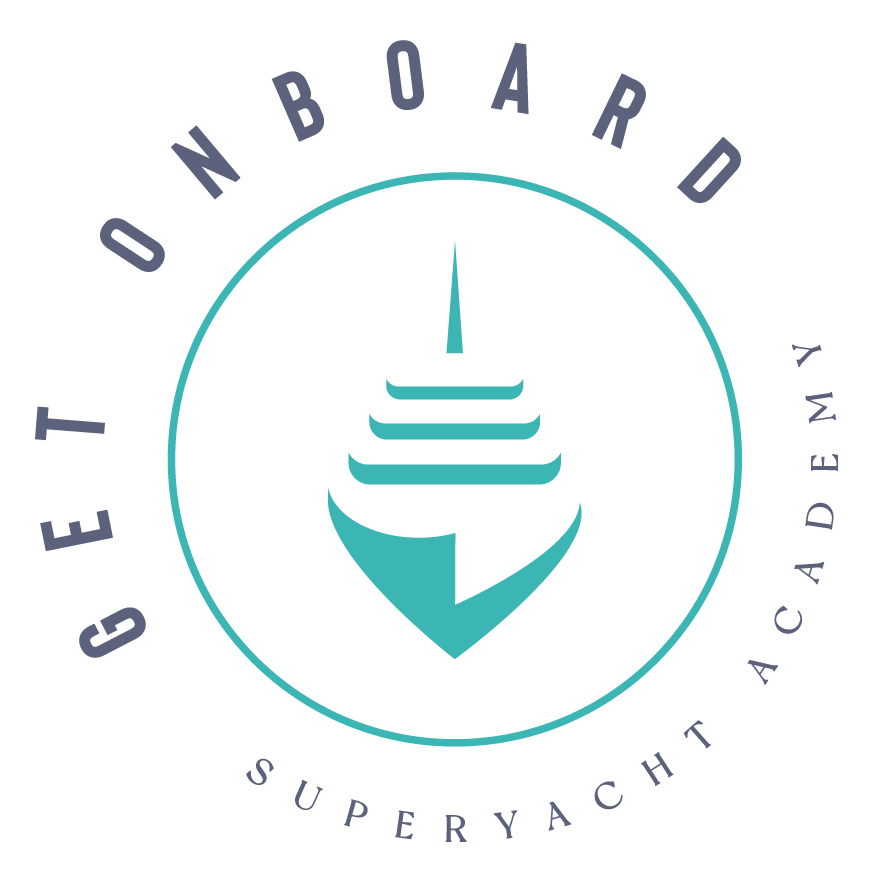
Get Onboard
Superyacht Training


How to Work on a Superyacht, with no Experience
Working in the superyacht industry looks like the dream job, right? But, how do you get started with no work experience? With over 12 years in the industry, interviewing and hiring countless candidates across various positions, we know first hand what information you require to get your first real crew job on a superyacht. In this post we highlight some of the features of our “Beginners Guide to Yachting” Ebook which explains all you need to know from how to get your CV yacht perfect, typical daily stewardess or deckhand duties, how to find day wo rk, and more.
What kinds of entry level positions could I apply for?
The two most common entry level positions on yachts are stewardess and deckhand jobs. These are both junior ranks whose primary concern is to keep the guests happy and ensure the interior and exterior are kept immaculately clean.
What previous experience is useful when looking for a job on a yacht?
While working on a yacht is certainly different to any land-based career, there are a few land-based jobs that would have equipped you with skills useful on a vessel. Jobs that may be useful include:
- Hospitality-related jobs
- Waiting tables in a high-end restaurant
- Child care or au pairing
- Carpentry
- Sports or diving instructor
If you have already completed some form or degree or diploma in engineering or mechanics, this is also considered a huge plus.
Are there specific qualifications I need?
Yes. You will need an STCW 10 certificate to understand basic safety protocols, as well as an ENG1 Medical Certificate to prove that your health is in good enough shape to join a vessel. Get Onboard Superyacht Academy offers complete STCW and ENG1 training in Cape Town, South Africa. These are the only compulsory documents needed, but if you are interested in a specific role, we offer specialised courses to equip you for these.
How do I get my first job on a yacht?
Once you are qualified, follow these steps:
- Construct a CV. Be sure to include all relevant information and documents, as well as a friendly, yet professional photo of yourself. Download our free template for a starting point.
- Pick a location to start. Antibes in France, Palma de Mallorca in Spain, and Fort Lauderdale in Florida are great places to start out as a newbie.
- Find some day work. This is work outside of a formal contract, which may involve helping out for a day to several weeks. Day work is an excellent opportunity to network, build contacts in the industry, and get a foot in on your journey to securing a more permanent job.
How much money do you make working on a yacht?
The standard entry level salary for a junior stewardess or deckhand ranges between €2,000 – €2,500 or $2,300 – $2,800 per month. This amount is generally tax free, although the onus is on each crew member to check with their home county about tax obligations. Certain countries are tax exempt, provided you spend more than six months out of the county.
Check out our salary guidelines for more information. Still have questions? Get in touch with us , we’d love to help you navigate the seas of yachting!
Needing more?
Error: Contact form not found.
RYA/MCA Online
1. what are the basic requirements you need to be eligible to work in the yachting industry, 2. what is the stcw and why do i need it, 3. what is the eng1 medical certificate, 4. what land based experience will help me find a super yacht job, 5. what are the different departments onboard, 6. what crew training is required for me to work as a junior deckhand.
- Yachtmaster/Coastal Skipper Theory
- Yachtmaster/Coastal Practical
- Specialist Super Yacht Training Course (Deck Hand Training Course)
- RYA Power Boat Level II
- RYA Personal Watercraft Course
- RYA Competent Crew Certificate
- RYA Day Skipper Theory and Practical Certificates
- VHF Radio Operator’s License
7. What crew training is required for me to work as a junior stewardess?
- Stewardess Course
- Proficiency in Designated Security Duties (PDSD)
- MCA Food Safety Level 2
- RYA Powerboat Level 2
8. How do I book my training courses?
9. how do i get my first job on a yacht, 10. are these courses worth it, or am i just wasting my money, 11. will i get hired for my first job from south africa, 12. what is daywork, 13. what are the best locations to get a yacht job, 14. how much can a motor yacht stewardess or deckhand earn, 15. what are the negatives of working on a yacht, 16. what are the positives of working on a yacht, 17. is working on a super yacht for everyone, 18. what is the minimum age to work on a yacht, 19. is accommodation provided when i am completing my yacht training in cape town.
Impartial training and careers advice
Call us: +441983 280 641
+441983 280 641
- Get A Job On A Yacht With No Experience
Are you looking for yacht jobs but have no experience? No problem!
We’re not saying it will be as easy for you as it would be for a more experienced person, but there are still loads of opportunities if you know where – and how – to look for them.
Entry-level roles on a yacht are typically the best place to start
It goes without saying that you won’t get a job as a yacht captain if you’ve never worked on a yacht! You’ll need to set your sights a little lower at first, even if a captaincy is your eventual goal.
But don’t despair; you can still get yacht jobs with no experience – if you know how to go about it! The best place to start for most people is with an entry-level position. This most often means going for a job as a Deckhand or Stewardess.
We’d love to tell you that opportunities are blind to gender – they are supposed to be, after all – but in reality, females are far more likely to be hired as Stewardesses, and males as Deckhands.
This isn’t universal though, so once you have a job on board and have proven your value and reliability, it is easier to shift to a different position that is more in line with the career path you want.
If more senior crew members see your skills and aptitude for a different position, you’re way more likely to get it than if you demand a certain position right from the start.
Read on to discover our top tips for securing yacht jobs with no experience…
13 top tips on how to get yacht jobs with no experience:
1. gain an edge through qualifications.
Qualifications show more than just the skills they certify.
By stacking up a bunch of qualifications on your CV, you show commitment to the industry and a willingness to learn all you can, that is very impressive to a potential employer. Among the qualifications, you should start with are the STCW & ENG1 Medical.
STCW stands for ‘Standards of Training, Certification and Watchkeeping’ and STCW Basic Safety Training is a requirement for anyone who wants to work on a commercial ship – and that includes superyachts. You are required to refresh your fire fighting and Sea Survival qualifications every five years, if you are employed then the Superyacht will pay for any refresher courses.
ENG1 Medical is another mandatory certificate you’ll need to have before you can work on a commercial vessel. The ENG1 medical certifies that you are medically fit and free from any conditions that could prevent you from performing the regular duties that may be required of you.
It also reduces the chances that a medical emergency will happen when out at sea, far from hospitals and doctors. The ENG1 can usually be arranged through an MCA approved doctor, it can’t be completed by your GP. The medical can be arranged within two weeks or less, lasts for two years, and costs around £115.
2. Get all the qualifications in one place
Take our Deckhand or Steward/ess Courses ; both provide all the qualifications (minus the ENG1 medical). These types of courses are an invaluable part of how to get into yachting, and even more important to getting yacht jobs with no experience.
Having taken one or more of these not only shows that you are committed, but it assures the potential employer that you have a pretty good idea of what to expect, even if you’ve never worked aboard a yacht before.
Fewer unpleasant surprises for you means fewer unpleasant surprises for your employer – and that’s great!
3. Have the right attitude
Most employers are willing to train their crew members . In fact, many employers prefer this, as they can ensure that the people they are taking on board don’t have bad habits that have to be overcome.
What they demand, however, is the right kind of attitude. These vary, but you’ll recognise them.
4. Embrace the willingness to learn
Go into every situation with an eye for something you can learn.
If you take on a new piece of information even once each day, this will cumulate into a wide and deep knowledge of your duties, the industry, the yacht you’re on, and the people you’re there to look after.
By being willing to learn, you let a potential employer know that they can get your positive experience and attributes, and add knowledge and experience to them over time. If they get the impression that you think you know it all already, they won’t take the risk on you.
5. Follow directions
Train yourself to listen carefully, listen actively, and to remember the detail. Picture actions in your head as you are being given directions.
Imagine yourself doing the actions you’re being told to do. Once you are on your own to fulfill them, you’re more likely to remember and to do the job properly.
A potential employer won’t mind so much that you’re going for a job on a yacht with no experience if he or she is confident that you will put the experience you do get to good use.
6. Know your place
It sounds a bit outdated, but there is a strong hierarchy on most sea vessels , and yachts are seldom an exception.
You will be an employee there. You don’t have to put up with abuse, but you are not going to be treated the same as the owner, the client, guests – or even more senior crew members.
By accepting that your job is to make the clients feel special and valued, and to ensure the other crewmembers that you are there to be part of a team, you show that you understand the dynamic, and won’t make any serious gaffs.
Taking pride in the service provided is perhaps rare nowadays, but with the right attitude, it is very satisfying.
Show yourself to be a high-quality provider of confident service and respect, and you’ll be perceived as a valuable asset aboard the yacht.
Perhaps even more important than respect and reasonable humility is safety.
Having fun and being silly has its place, but that place is not at your interview, nor during your trial period, nor anytime that you are not 100% certain that it is within the bounds of expected behaviour.
Likewise, by displaying your knowledge of safe behaviour, you give your potential employer less to worry about. On the contrary, you’ll give off the air of being a dependable crewmember – and that’s worth a lot to a crew!
8. Be courteous
There are a lot of things that are not against the rules, but are also not the right thing to do.
There isn’t a list of them, and you won’t find a book on them, but you probably have a good idea of most of them anyway. As a rule of thumb, act toward the owner, the vessel and the crew the way you would want to be treated in each position:
- How would you want your crew to dress and to act?
- If you were the captain, what kind of response would you want to a request or an order?
- If you were the owner, how would you want the crew to address you?
When you know expectations more specifically – like the owner wants to be referred to by a formal title such as ‘your excellency’ or something similar – then you act accordingly.
Until then, do your best. Take any mistakes as learning opportunities. When in doubt, lean toward the more formal, the more courteous, and the more conservative.
This is advisable for informal meetings, job interviews , trial periods and the job in general.
9. Be professional
This term is popular, but difficult to define.
The best way to think about it is as a combination of those things we mentioned above. Be quick to learn, attentive to instructions, aware of and compliant with safety regulations and practices, and always be courteous and respectful of those you work for and with.
A more difficult part of this is to take pride in what you do, and to respect your own position, however humble it may seem in the company of captains and owners and guests. You can expect to be treated with normal human respect, not to be abused, and to be given room to learn how to do your job better.
In most cases, professional behaviour will be met with a respectful response.
10. Have the right CV
If you’re still referring to your CV as if it is one, static thing, then this is one of those learning opportunities. In reality, your CV should be almost as varied as the positions you’re applying for.
It all has to be true of course, or you’re setting yourself up for grief and failure – but a properly crafted CV will put your name at the top of the ‘possible hires’ list… and that’s what will get you your interview or trial period.
Tailor your CV to suit the position on offer. Be truthful, but highlight the things that fit what they’re looking for. Is the yacht in a very hot climate?
Show experience working or living in very high temperatures. Are you likely to be offshore for weeks at a time? Express your desire for adventure and challenge.
Always include other languages spoken, international travel, hospitality or mechanical skills, and of course any experience you’ve had on boats or ships in the past.
Look for keywords in the job description and – tactfully – add them to your CV. For example, if the advert states that it’s looking for ‘responsible’ crew, then highlight positions of responsibility you’ve had in the past.
It can be anything from childcare to responsibility closing a shop in the evenings or opening it in the mornings.
Most of all, make sure each of the advert’s ‘must-haves’ are covered. If you are missing any of them, highlight the lack but explain why another attribute makes up for it and that you are quick to learn.
If there is also an ‘also beneficial’ section, cover those too. If you skilfully tailor your CV to each job, you will show yourself to be the one they’ve been looking for all along.
11. Go to the right marina
If you picture yourself in crisp whites, striding the polished deck of a superyacht, don’t look for work at a narrow boat marina. Go where the yachts are.
You probably won’t get a position on a superyacht for your first gig, but you’ll want something similar.
Look for ocean-going experience in the luxury sector. You may need to start on the small end of the spectrum, but make sure you’re on the right spectrum!
If you can, get out to the fancy marinas and make yourself known (in a good way). In other words: network.
12. Network and get your name out there
Any time you can become known to people in the industry – from deckhands and stewardesses to captains and billionaires – you should take the opportunity to do so.
Shake hands, smile, show yourself to be clean, tidy and in possession of the right air and attitude.
Join Facebook groups of people who work in the industry. Make sure your Social Media presence is positive and that you don’t get caught up in criticising or complaining about those you want to hire (and pay) you.
Your social media should reflect all the things a prospective employer might like. In this day and age, it is very likely they will look at your profile before offering you a job.
Look for related job fairs as well; contact yacht crew agencies such as YPI Crew and Insignia Crew, or through your training centre like Flying Fish who have contacts in the industry. We take students to Antibes to find work .
13. Be flexible and willing to start anytime
The key to getting a job on yacht with no experience is to be focused on the experience – not the pay or even the type of job.
If you have a chance to get someday work, you gain items to add to your custom CV. Add a few of these and suddenly you aren’t the one with no experience anymore. A few good showings as a temporary crew can mean you’re the first one an employer calls when there is a vacancy to fill.
This willingness shows a serious drive to be a part of the industry – not simply a drive to earn some cash doing any old job. That’s the kind of person prospective employers are looking for.
Ready to find your first Superyacht job?
All the above tips should give you a solid starting point from which to search for yacht jobs with no experience! You should also download our guide to finding and thriving in your first Superyacht job below.
The next step is to complete your Superyacht training! Simply get in touch to book your place on our Superyacht Deckhand course or Superyacht Stewardess course today.
Related articles
- Seafarers Tax
Do I need to pay off my Student loan if I work on a Superyacht?
Good question! First, let me say that the information below is aimed at people who have studied in the UK and took out a Student Loan to cover course ...
Have I got the right experience to work in yachting?
If you’re thinking about working on board a Superyacht, we share the skills and experience you need and how to get into the yachting industry in thi...
Download – Ultimate Guide to Working on Superyachts
So you’re thinking about getting a job on a Superyacht? Having a career on a Superyacht is a dream job: it will change your life forever. You g...
How to Find a Yacht Job with No Experience
Learn how to land a yacht job with no experience. From STCW certification to crafting the perfect resume, this guide covers essential steps for aspiring yacht crew.
The thought of spending days and nights on a luxury yacht is enticing to anyone. Even more enticing is the idea that you could get paid to spend time on a yacht, even if it means you’ll have to work hard. With more online exposure than ever, countless people have become fascinated with the idea of working on a yacht. Even still, many people struggle with how to find a yacht job without experience.
You can find a yacht job without experience if you get a Seafarers Medical Certificate and STCW certificate. This requires you to take a basic examination and 5 courses that highlight fire safety, security awareness, survival techniques, and first aid. Create a comprehensive resume that includes basic skills like communication as well as your past work experience.
Make sure to express your willingness to take instruction and learn as much as possible about the trade. Nobody expects you to know everything if you haven’t worked on a yacht before, so they will be patient if you work hard. Follow along as we explore how to find a yacht job without experience.
How Do You Get a Job on a Yacht With No Experience?
Getting a yacht job without experience may seem impossible, but it’s easier than you may think. Whether it be networking or signing up for basic training courses, there are several easy steps you can take to find a yacht job without experience.
1. Make Sure You Qualify
You can only get a job on a yacht without experience if you meet the qualifications. This includes an ENG1 medical exam and an STCW certificate. STCW certificates show that you have a basic understanding of fire safety and survival skills.
The ENG1 medical exam is important because everyone who works on a yacht must have a Seafarers Medical Certificate. You can only get your certificate if you visit an approved doctor for a basic medical examination. Once you Seafarers Medical Certificate, you must go back to the doctor every two years for another examination to make sure you still qualify .
2. Create a Resume

A resume is necessary to find a yacht job even if your past work experience has nothing to do with yachts. The personal paragraph is one of the most important parts of a resume for a yacht job. Make sure to keep it short and sweet while highlighting why you want to work on a yacht.
It’s important to highlight what you bring to the table and make it clear that you are willing to learn. The rest of your resume should consist of your education and past employment history. Yacht jobs are often varied and require several skills, so it helps if your past work experience entails several different skills .
Include your Seafarers Medical Certificate and STCW certificate in your resume. If your resume is striking enough, you will hopefully get an in-person interview!
3. Join Luxury Yacht Group

Luxury Yacht Group is a great resource for anyone trying to find a yacht job without experience. This agency helps thousands of people find crew work on yachts throughout the world each year. Not only do they help crew members find jobs, but they also help people that own and charter yachts find crew members .
That makes Luxury Yacht Group invaluable for prospective crew members as the service has countless contacts. You simply set up an account, provide your availability, and search for job postings. Crew members with varying experience levels use Luxury Yacht Group, and it’s perfect for beginners and seasoned workers alike.
4. Complete STCW Training
You may not need past yacht experience to get a job, but you must have completed basic training. Standards of Training and Certification of Watchkeepers (STCW) training is necessary to find a yacht job. The International Maritime Organisation regulates boating and shipping throughout the world.
They strictly require shipping and yacht personnel to undergo STCW training. The training includes fire prevention, fire fighting, first aid, security awareness, and survival techniques . Each of these categories is essential to keep everyone safe on a yacht in case the vessel takes on water or someone gets injured.
It only takes 5 days to complete STCW training, and it’s worth the time if you want a yacht job. You can take each course individually, but I recommend taking them all together so you can get your certificate in 5 days. You can register for STCW training online. Once certified, you must redo your fire safety and sea survival courses every 5 years.
5. Book an Interview
Working on yachts has a lot to do with your charisma and communication skills. That’s why it’s important to make a great first impression when you book an interview for a yacht job. Yacht jobs are similar to many service industry jobs in that you must be polite, concise, and forward with people.
This should all come across in your interview so your potential employer sees how you would be perfect for the job. Bring your resume and certifications so they know you’re prepared and responsible . Whether you get hired or not, make sure to leave a memorable impression because they may be able to hire you in the future.
6. Be Open to Training
Some training will be necessary if you find a yacht job without experience. This is true even if you have your STCW certificate. Luckily, many captains are understanding and realize there is a learning curve for working on a yacht.
Be open to training and try your best to learn on the job. On-the-job training is more useful than taking courses, but only if you listen well and collaborate with the other crew members . The hands-on experience you get will help you learn much more quickly than any training course, even if it can be overwhelming at first.
7. Meet New People
The phrase “it’s who you know, not what you know” is accurate in the world of yacht jobs. Of course, you must have a practical and hands-on understanding of the job, but you’ll get more work if you network with others. You will likely work with several crews on different yachts throughout the season or year.
Connect with your coworkers to get tips about jobs and resources you can use to stay busy. It also helps to spend time at local marinas to declare your availability and find new job leads . Sure, online resources are useful, but I find that mingling with other people and speaking in person makes it much easier to find work.
8. Keep Your Schedule Open
Keep your schedule open when you’re trying to find a yacht job. Yacht jobs often come in without much notice, so it’s a good idea to keep as much space open in your schedule as possible . You will get the most yachting jobs in summer and winter, so avoid scheduling too many plans during that time.
Sure, you may miss out on some social events, but it’ll be worth it when you quickly build an impressive yacht job resume. You may get calls when other crew members cancel on a job or if someone charters a yacht last minute without any notice. People will continue to offer you jobs if you regularly say yes even at a moment’s notice.
9. Regularly Update Your Resume
Update your yachting resume after each job. Make sure to include contact information for former employers and captains to give yourself more legitimacy . You will need to apply for new yachting jobs after each gig, so it’s important to constantly update your resume so it’s as impressive as possible.
It’s especially important to update your resume if you get new certifications. For example, some people may start as stewards and eventually study a trade, such as electrical work. Once you get a degree or certification in a specialty, you must add it to your resume.
This can open the door to new job openings that pay better.
10. Honor the Hierarchy

Like any workplace, yachts have a hierarchy amongst the crew. Familiarize yourself with the hierarchy of a yacht crew before your first job. The captain is the highest-ranking position, followed by the first mate, lead deckhand, deckhand, chief engineer, and second and third engineers .
Stewards and stewardesses are the basic entry-level yacht jobs. As a steward, it’s important to honor the hierarchy, make a great impression, and see how the other positions work. From there, you can decide if you’d like to pursue another position.
For example, you may work several jobs in the galley and on the deck as a steward and realize you want to pursue an electrician job . Find an appropriate time to speak with the onboard electricians and see what steps you need to take to pursue that position. The same can be said for any yachting job, and as long as you show respect, you can work your way into any job title.
What Skills Should I Put on My Yacht CV?
Your yacht CV (Curriculum vitae) should include everything from basic skills like communication to special skills like navigation. The resume should reflect your skill set. For example, make sure to include any past electrical work and certification if you’re looking for an electrician or engineering job .
Conversely, stewards must include past service industry jobs and experience to appeal to employers. Yacht chefs must have past food service and chef experience. Write your resume to reflect your past work experience and the job title you are looking to get.
What Is The Easiest Job on a Yacht?
No yacht job is easy, but it’s easier to get steward jobs because they don’t typically require specialized skills. Stewards and stewardesses serve food and drinks to guests throughout the trip. This requires lots of attention and communication skills, and while it’s not easy, it’s easier than being a yacht engineer or electrician.
How Much Do Yacht Stewardesses Make a Month?
Yacht stewards and stewardesses can make up to $5,000 per month. It ultimately depends on your daily or weekly rate. Yacht jobs typically carry daily rates, but you are sometimes paid by the hour.
One of the biggest appeals to yacht workers is that you can make a fortune with tips. A yacht’s crew receives 5%-15% of the charter price in tips in many cases, and that makes up a big portion of a stewardess’ monthly pay . Once you become a chief stewardess, you can make up to $90,000-$100,000 each year.
So, How Do You Get a Yacht Job Without Experience?
The best way to get a yacht job without experience is to get an STCW certificate and take an ENG1 medical exam. Once you have these certificates, you can include them in your resume. Use online resources like Luxury Yacht Group to get yacht jobs, and network with people at local marinas. Make sure to get a medical exam every 2 years and retake your fire and sea survival courses every 5 years to keep getting yacht jobs.
Kit Evans is a seasoned marine journalist and naval architect, bringing over 20 years of multifaceted experience in the boating industry to his writing and consultancy work. With expertise ranging from boat design and marine surveying to charter operations and vessel restoration, Kit offers unparalleled insights into all aspects of maritime life. When he's not penning articles for top boating publications or hosting his popular YouTube channel, Kit can be found sailing his lovingly restored 1960s Columbia 29 on the Chesapeake Bay, embodying his commitment to both preserving nautical heritage and embracing modern innovations in boating.
Recommended Reads
Trending reads.

15 Best Lobster Boat Tours in Maine
Explore the top 15 lobster boat tours in Maine for an unforgettable experience. Learn to catch lobster, enjoy marine life sights, and more. Ideal for travelers!

How Much Does Freedom Boat Club Cost?
Explore Freedom Boat Club costs state by state! Learn about membership fees, benefits, and why it's a budget-friendly option for boating enthusiasts.

20 Best Liveaboard Marinas in North Carolina
Explore the top 20 liveaboard marinas in North Carolina, perfect for travelers seeking a unique on-water living experience with all amenities included.
Your trusted source for travel guides, tips, and insights since 2020. Empowering adventurers with expert advice for smarter, more rewarding journeys.
- Charleston Accommodations
- Charleston Bachelorette Party
- Charleston SC Nightlife & Bars
- Charleston SC Restaurants
- Charleston SC Things To Do
- Folly Beach SC
- BACHELORETTE PARTY PLANNING
- WORK ON A YACHT
- MUSIC FESTIVALS
- TRAVEL GEAR & PACKING CHECKLISTS
- CONNECT W/BAKER MANNING
- SHOP MY FAVORITE GEAR

Folly Beach South Carolina United States: Your Coastal Paradise Awaits

Firefly Distillery: An Authentic Lowcountry Experience

Charleston Breweries: A Fun Bachelorette Party Activity

The Ultimate Guide to Finding the Perfect Charleston SC Airbnb

15 Things I Hate About Charleston Life… Travelers Beware!

Slay Your 2024 Charleston SC Bachelorette Party

The Best Things To Do in Charleston South Carolina in 2022

8 Crucial Things to Know About Nightlife in Charleston SC

51 Unique Things To Do in Charleston That Don’t Suck…

4 Entry Level Yacht Jobs For Beginners
In this post we're going to learn about the 4 entry level yacht jobs that are options for new yacht crew who have no prior experience working on a boat. We will also go over the following topics:
- The 15 crucial qualities that every yachtie must possess
- Stew/Deck/Cook
THE YACHT JOB HANDBOOK + ONLINE COURSE
2020 holiday flash sale .
TO GET 50% OFF USE COUPON CODE: HALFOFF2020
The Yacht Job Handbook & Online Course
In The Yacht Job Handbook , I'll walk you through the entire process of getting a job on a yacht. I’m going to break down this process into a step-by-step formula that will serve as a roadmap to help fast-track your career so that you can start getting paid to live, work, and travel the world on a luxurious yacht.
4 ENTRY LEVEL YACHT JOBS FOR NEW YACHT CREW
There are all types of different tasks that need to be performed around the clock to maintain a yacht and keep it running smoothly. While some of the job positions onboard are very technical and require a lot of skill and knowledge, there are 4 entry-level jobs that require little to no prior experience. The most common entry-level jobs on a yacht are some variation of:

1. Yacht Stewardess / Steward
2. deckhand yacht jobs, 3. cook / chef yacht jobs, 4. stew / deck / cook yacht jobs.
15 CRUCIAL QUALITIES THAT EVERY YACHTIE MUST POSSESS
While prior experience isn’t necessary to perform the duties of an entry-level crew member, there are a few abilities and qualities that every member of a yacht crew must be able to demonstrate if they want to succeed. Whether you’re a greenhorn or a seasoned vet (while you’re working) you must be:
- Professional
- Presentable
- Resourceful
- Composed Under Pressure
- Able to Maintain Discretion
- Able to Maintain Safety
- Able to Aid in Emergencies
- Able to Follow Orders
- Able to Prioritize Tasks
- Able to Learn and Act Quickly
Tips and Tricks
- Always keep an open mind and try new things - you may think you are meant to be a stewardess and find that working on deck suits you more, or vice versa.
- Don’t get too intimidated when looking at the skills and duties listed below. While these are skills you will be expected to learn and cultivate eventually, (the quicker the better,) you don’t necessarily have to have prior experience when you’re just starting out.
- Teamwork makes the dream work. As a member of the crew you’re part of a team, so you should expect to help out anyone and everyone on board if necessary, even if it’s not technically a normal part of your job or department.
SUPER YACHT CREW JOBS
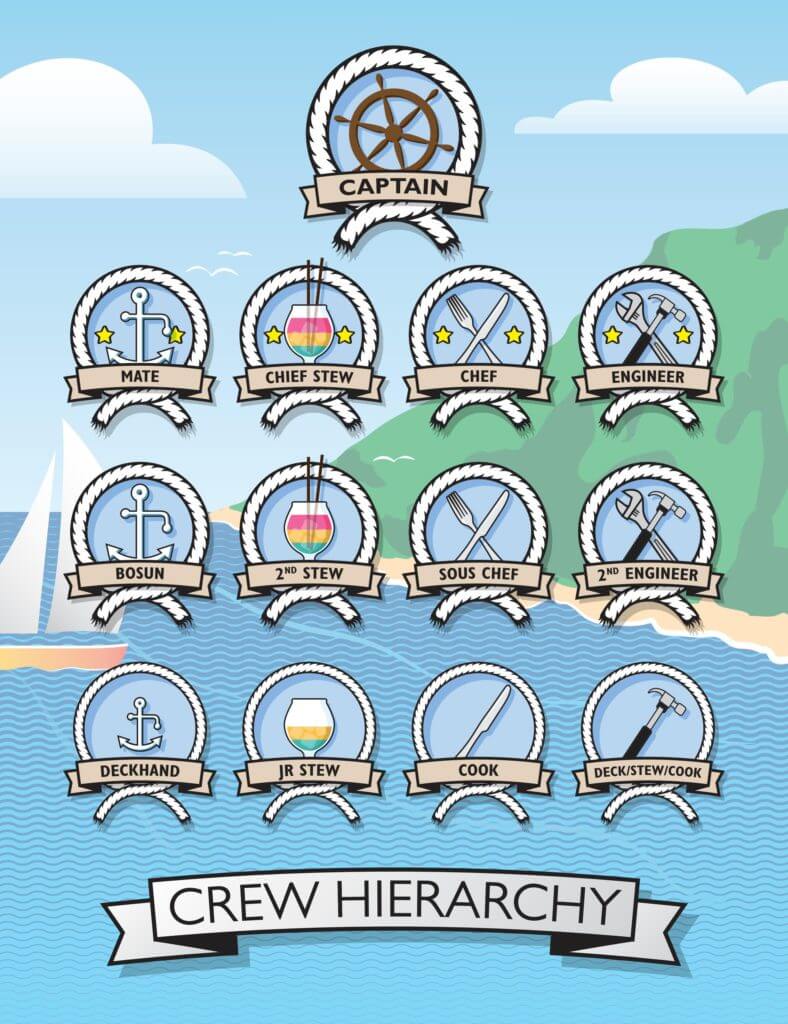
You may have a very impressive resume back on land, but college degrees and PHD’s will not go far on the 7 seas! If you’re serious about pursuing a job on a yacht- you will have to work your way up the ranks one step at a time. Whether you want to start a new career, or just try it out for a year, you’re going to have to start….
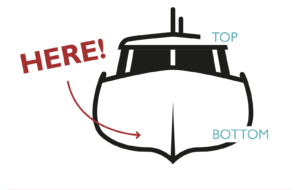
YACHT JOB DESCRIPTIONS
You’ve gotta get in where you fit in!
Let’s take a closer look at each of these positions so that you can decide for yourself: which crew are you!? Below we will go over the general overview of each position. If you would like to learn more about what type of personal skills are necessary to perform the typical day to day duties.
Stewardess/Steward:
- As a stewardess your domain is going to be the interior of the boat, meaning a majority of your time will be spent inside .
- You will be responsible for the upkeep, appearance, and cleanliness of everything , and you will be expected to do so with an an extremely strong attention to detail. A guest should never have to be burdened with the site of one single finger print or speck of dirt on any surface!
- Guest Service
- Hospitality
- Housekeeping
- This position is more commonly held by females, although not always.
- Many boats are now combining the roles of a stewardess with those of a deckhand or even a cook.
- This job is great for high energy, resourceful, and well-organized individuals. You will be expected to work around the clock , ensuring that the guests’ needs are met. The word “no” is no longer a part of your vocabulary. Their wish is your command!
Useful Skills for a Yacht Stewardess
The following are skills that are useful or necessary to perform the duties of a stewardess:
- Silver Service
- Guest Hospitality
- Event Planning
- Table Setting
- Napkin Folding
- Strong Attention to Detail
- International Etiquette
- Child Care / Nannying
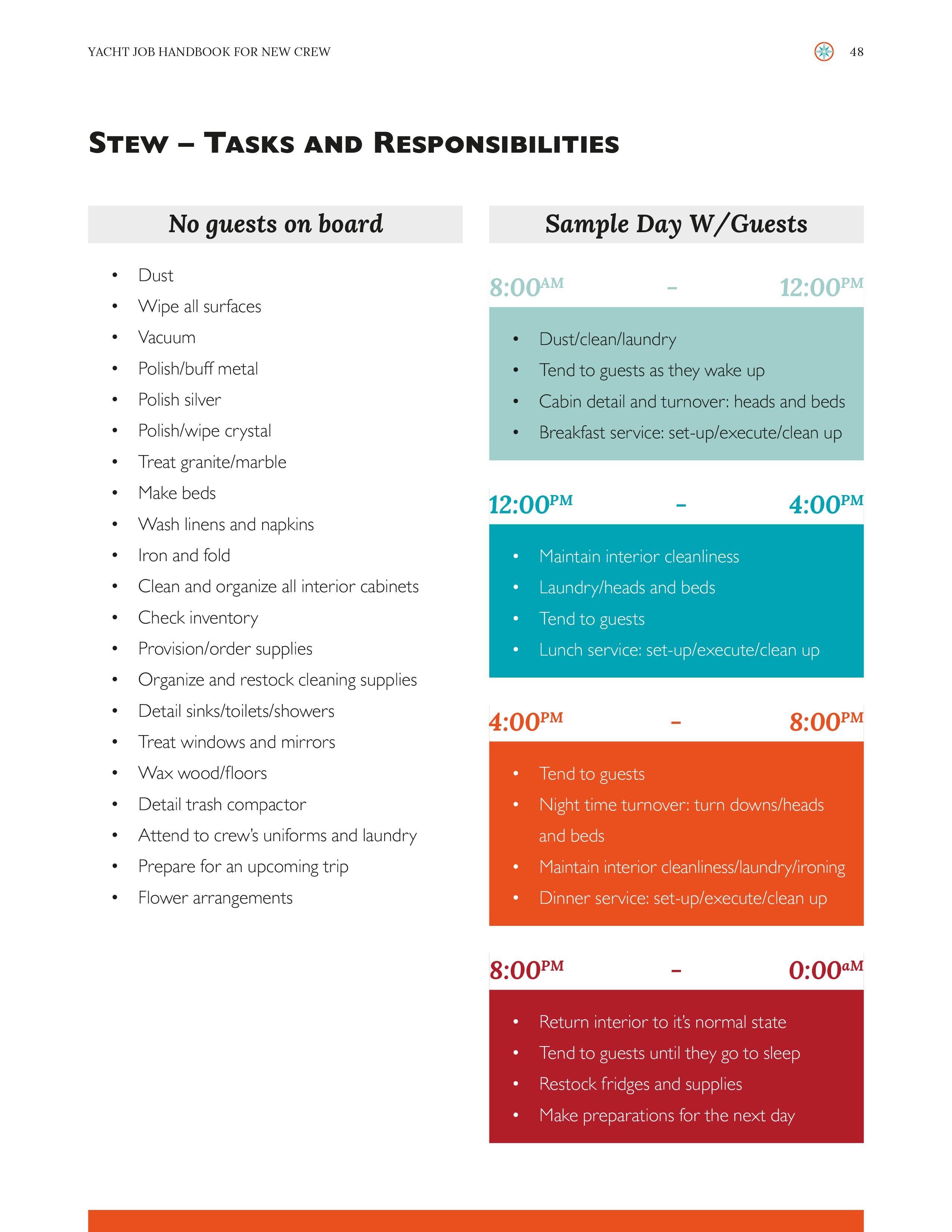
- As a deckhand you are responsible for the exterior of the boat, and a majority of your time will be spent outside . Keep this in mind if you can’t handle the sun beating down on you all day !
- You basically have to make sure the exterior of the boat looks brand new at all times, which can be a LOT of work, and let’s just say- manual labor .
- You also have a lot to do with preparations for leaving and arriving to port, as well as any of the watersports or other outside toys that come along with the boat such as jet skis, paddle boards, inflatable floats / slides, etc.
- You must monitor and maintain the safety of the guests and crew at all times.
- When guests are on board you will help prepare and execute any outdoor excursions such as snorkeling, fishing diving, surfing, beach picnics, etc. (and sometimes you may even get to participate.)
- A majority of deckhands are male, but there is a fast growing number of female deckhands or deck/stews in the industry. I was a deck/stew on my first boat and highly recommend it!
- This is a great job for a strong, adventurous, outdoorsy person who is able to spend long hours outside in the sun, and doesn’t mind getting wet, sweaty, salty, and sandy on a regular basis. Physical strength and stamina are 100 % necessary.
Useful Skills for a Deckhand on a Yacht
The following are skills that are useful or necessary to perform the duties of a deckhand on a yacht:
- Cleaning / Washing
- Waxing / Polishing
- Boat Driving
- Line Handling
- Tying Knots
- Securing / Stowing / Covering Furniture
- Woodwork / Varnishing
- Construction
- Watersports / Fishing
- Mechanics / Engineering
- Physical Strength / Stamina
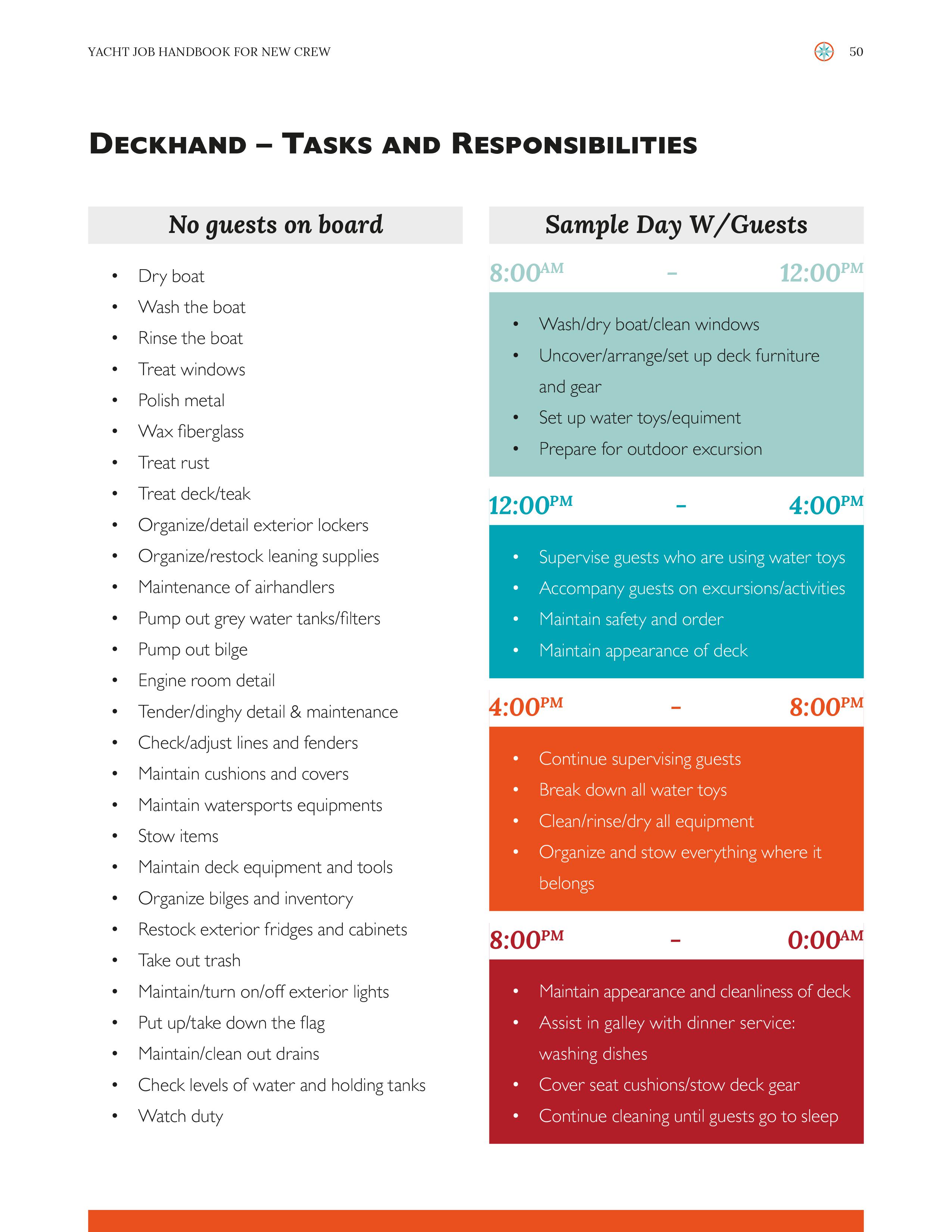
MAKE THIS DREAM JOB YOUR REALITY!
Thanks for subscribing! Please check your email for further instructions.
Yacht Chef / Cook
- As a chef your domain is the galley (the kitchen of a boat) and nothing else. You may spend 16 + hours in the galley all day if that is what the job entails. Many people would agree that on many boats- this is the most tedious position of all.
- While most chefs are very experienced, some smaller boats will hire on less experienced “cooks” or even just people who claim they can cook, and often times that role may be combined with a stewardess or deckhand position.
- As a chef aboard a superyacht you are expected to concoct culinary masterpieces for every single meal that the guests eat on board. You must be knowledgeable, versatile , and creative and it is advised that you really have a passion for preparing food because you will be doing it around the clock!
Useful Skills for a Yacht Chef
The following are skills that are useful or necessary to perform the duties of a yacht chef:
- Strong Culinary Background, Education, and Skills
- Extensive Experience in a Professional Kitchen
- Meal Planning / Preparation
- Food / Wine Pairing
- Gourmet Food Presentation
- Time and Space Management
- Food Prep / Handling
- Table Settings
- Provisioning
- Adaptability / Flexibility
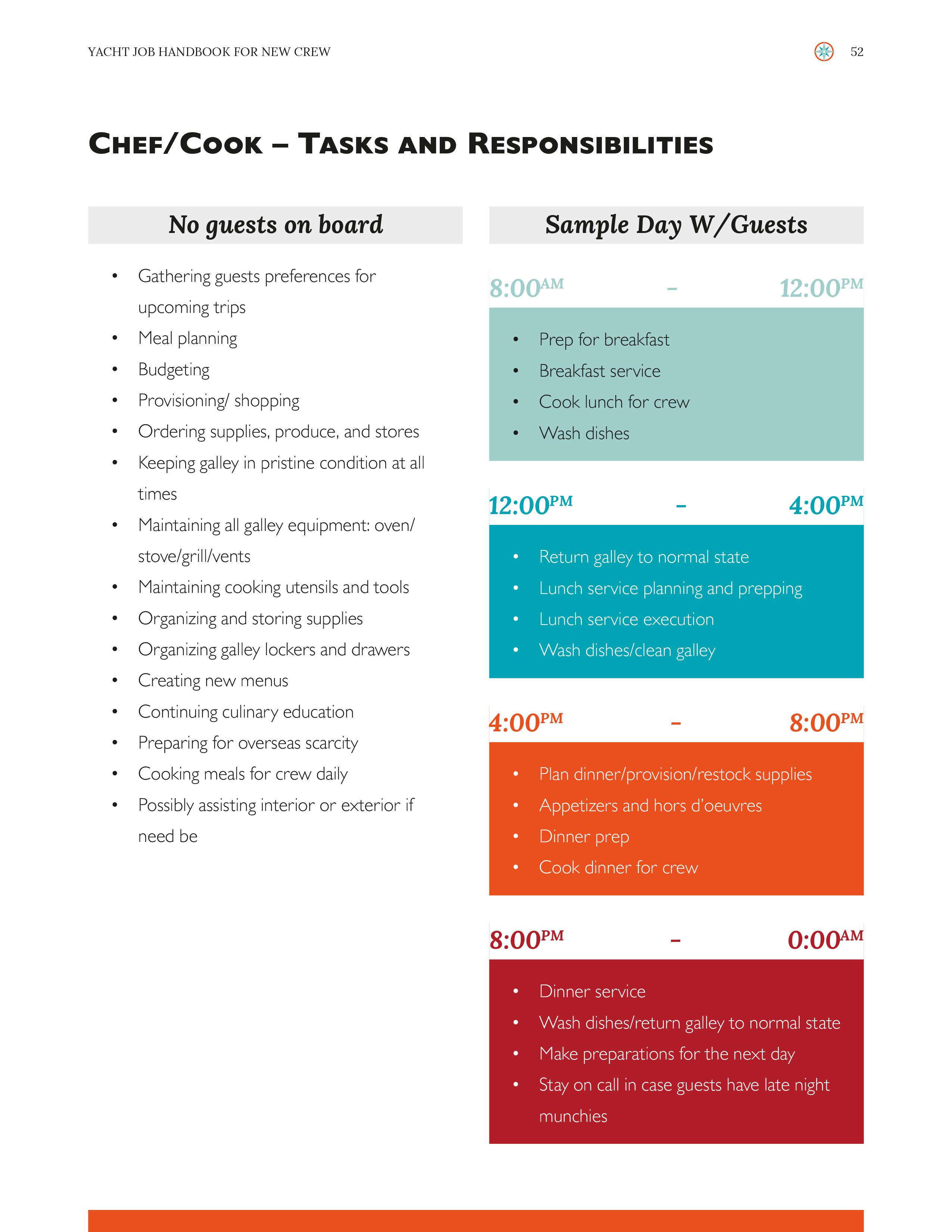
Stew / Deck / Cook
- As I mentioned above, many boats combine the roles of a deckhand, stewardess , or cook into a hybrid position in which you basically carry out a variety of tasks that depend upon what is the most urgent, or which of the work detail circumstances (listed below) the boat is in.
- In this case you just bounce around to where you are needed most and serve as an assistant to the rest of the crew. It is a great opportunity to learn the foundations of all of the positions on board and eventually decide which position you truly enjoy the most if /when the day comes that you have to choose one.
- There is really no end to the different variations of tasks you will have to perform in one of these combined / hybrid positions.
- My advice to you if you get a job offer for one of the “joint positions above” is to make sure that it is clear of what is expected of you before you accept the job.
- Sometimes (not too often) new crew get taken advantage of by accepting a position (with low pay!) and ending up having to perform way more duties than what is fair or even humanly possible.
- On the other hand- I highly recommend a joint position as long as you know what you’re getting yourself into and everything seems fair.
"THE WAKE OF BAKE"
ENTER TO WIN!
Subscribe to my YouTube channel and you will automatically be entered to win a free digital download of The Yacht Job Handbook. A new winner is chosen every Friday.
Follow us on Instagram @bakermanning87
- LET’S CONNECT
Yacht Stewardess and Deckhand Jobs and Contracts
7 videos you better watch before working on a yacht, 14 tasks you must complete before you can work on a yacht, what is it really like to work on a yacht.
- Brokerage New Construction How to Buy How to Sell
- Yacht Fleet Yacht Catalog Charter Marketing Destination Guides
- Financial Services Payroll & Accounting Payroll Service Process Logistical Support Admin Services Crew Admin
- Job Descriptions Crew FAQ
- About Sitemap
To Work on a Yacht Without Experience – Make a Plan
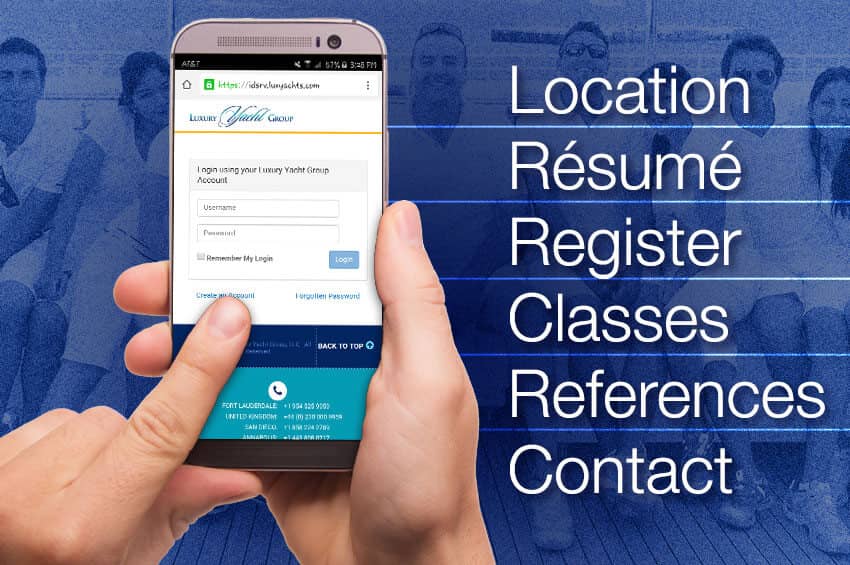
Yachts do hire people with no experience in yachting. The entry-level positions which offer new crew the best opportunity to learn the “ropes” in yachting are: junior deckhand, stewardess, steward, or cook. The key to finding your first position onboard is preparation.
There is a lot of competition for the rookie jobs on yachts. Begin your job search by identifying what skills you have that would be useful on a yacht. Assess your present skills and experience to focus on the characteristics that apply to the job you are targeting. Applicants with professional hospitality experience and training, at a hotel, resort, cruise ship, estate, or restaurant, are at an advantage in entering yachting. Holding specialty skills is also a means to enter the industry, such as masseuse, au pair, fishing guide, engineer, kite surfing instructor, pianist or helicopter pilot. You may just hold the skill that a captain needs to supplement his crew.
In all cases, stepping aboard will require a willingness to work hard and long as part of a team. An interest in learning and being flexible will increase your chances of finding a position that opens a new career path.
To get hired on a yacht with no experience you need to:
- Be in the right place at the right time
Have a professional resume
Register with luxury yacht group.
- Complete basic STCW classes
- Build references with day work
- Maintain contact 24/7
Be in the right place
There are seasons in the yachting industry. You will have the greatest opportunity without experience if you are in the location of highest demand and that changes throughout the season. The European season is May through September, centered in Antibes, France. The Americas/Caribbean generally place out of Fort Lauderdale early winter and early spring. In-person interviews are vital to success in finding a first opportunity. Arrange for flexible accommodations and have adequate living expenses to support yourself through a potential two month job search. Many first time yacht crew receive an immediate offer based on being in the right place at the right time, and could say “yes” on a moment’s notice.
Prepare a CV that portrays you as an energetic team player. Take care with the details. The resume is your best marketing tool. Typos and grammatical errors are red flags for a crew agency. Include a good photo as it is the industry standard. Smile and look the part. Use the Luxury Yacht Group web site for guidance on the basic skill sets for entry level positions. Be diligent in defining experience and highlighting transferable skills. Education, previous job experience, training or knowledge specific to the industry will get your CV a second look. List your most recent experience first. Hobbies and volunteer work can also illustrate character and work ethic. Diving, water sports, fishing, woodworking are hobbies which enhance your fit on a yacht. Provide professional references who have given you permission to use them as a contact. Captains look for an intersection of experience, certifications and personality in making hiring decisions. Give yourself an edge with a bit of personal detail – playing a musical instrument, proficiency in languages, flower arranging – to add dimension to your personality on paper.
Register with Luxury Yacht Group. A large agency with high placement volume offers the most opportunity to identify options for inexperienced crew. Be prepared to interview. Understand the requirements of entry level positions and how to explain the relevance of your experiences. Share stories which illustrate your work ethic, ability to solve problems and work in a team. Be on time and make a professional appearance. Some entry level positions have few specific requirements, but a captain will define specific preferences in a candidate. During an interview offer detail, enthusiasm and discretion when sharing experiences to display your ability to do routine tasks aboard, multi task, and be part of a team. Keep in touch with the agency regularly by logging into the website and confirming interest in any jobs that look good to you. Update your CV as you pick up day work experience, establish local references and complete any coursework you can locally while looking for work.
Complete basic licensing
Basic STCW is a minimum requirement to work on yachts that charter. The course has four parts and takes a week to complete. The modules which make up the Basic STCW certification are: 1) fire prevention and firefighting, 2) personal survival techniques, 3) personal safety and social responsibility, 4) first aid/CPR. Once the certificate is earned, it is valid for five years. Some modules do not expire. Check with your maritime school for details.
Establish references
During the search for a first job aboard, do day work. It is an excellent means to learn your way around a yacht. It is also a way to understand the physical demands and working style of yachts. Day work also provides you with local and yacht specific references. Be flexible on what you are willing to do – cleaning, polishing, detailing, laundry, wash-downs, painting. A seasonal or temporary job – even aboard a delivery without guests aboard – is a first step to a new career in yachting. Captains distinguish between applicants who want to enter a career and those who are looking to fill a summer. Educate yourself on the career path of the entry job so you can convey a commitment to yachting. (Immigration warning…many countries prohibit non-resident tourists from performing temporary “day work” when in their country. For example: a UK citizen admitted to the USA on a tourism ESTA cannot legally seek day work while in the USA.)
Maintain contact
Once a position of interest has been identified you must be available! Answer your phone and respond to emails immediately. Many entry positions are offered to the candidate who is ready to travel. Plans to attend a wedding in a month’s time….drop them. Partying Saturday night with friends….forget it, if the job offer comes in, you jump and get onboard immediately! One of the main reasons yachts pay well is that they expect a very high level of commitment.
Marianne and Gerard are examples of crew hopefuls with no yachting experience. Putting yourself in the shoes of a crew agent or captain, would you consider either of them for a rookie position aboard?
Marianne developed a love of the water fishing with her gramps. He taught her how to trailer his small boat, to steer, anchor and cleat. She described how much fun they had washing down the boat after a day on the lake and spending the winter sanding and painting. While in college she became such a yoga enthusiast that she taught the entire family where she worked, as an au pair, a morning yoga routine.
Marianne has the basics of a junior deckhand. Maintenance is a significant part of the responsibility on deck. She also displays some experience to apply to tender driving. Since she has worked with children, there is an indication that she has the skills to interface with owner families and guests. Her enthusiasm for sharing yoga may be the extra she brings to share with guests. An interview will assess whether Marianne will adapt to the pace and demands of a large vessel and how she will adjust to a team effort.
Gerard was raised in a family who owned a small hotel in a mountain village which served two tourist seasons – winter ski buffs and summer hikers. He explained that he and his siblings pitched in at whatever needed to be done to keep the hotel guests happy and returning each year – serving meals, making beds, loading cars. When he left home to backpack the world, he earned cash along the way by bartending. He has created a favorite cocktail recipe and named it after his hometown.
Gerard lived within the hospitality industry. It appears that his parents instilled a client driven attitude from a young age. As a junior steward, he would be doing many of the same things he did at the hotel as a child. An interview can verify whether Gerard has the “white glove” service standard, understands the need for discretion, and that he would be interested in working within the ‘interior’. Captains will also want to clarify whether Gerard is interested in a yachting career or if he is just adding the experience to his backpacking adventure.
The yachting industry is not a career for everyone. Rookies will find that work on a yacht is demanding, but offers great rewards. Finding a position on a yacht with no experience requires being prepared, having a detailed plan, and maintaining a positive attitude. Follow the steps outlined to increase your chances of coming aboard!

Engineering License Changes
The MCA has restructured the engineering certifications. The MEOL course has been done away with, and the AEC course made mandatory and more thorough. Luxury Yacht Group explains all these changes, what engineers progressing through the ranks can do now, and how Y ticket holders can convert their licenses over to the structure.
14 Mar 2018

A Day in the Life Series – Chief Stewardess
For a yacht to run smoothly, it requires many working parts, and the interior department is a large component of this. The chief stewardess oversees this department and makes sure all the stewardesses onboard know what their tasks and responsibilities are. The interior department is largely in charge of the guest services whilst they are onboard, and responsible for interior maintenance of the yacht when they are not.
18 Dec 2017
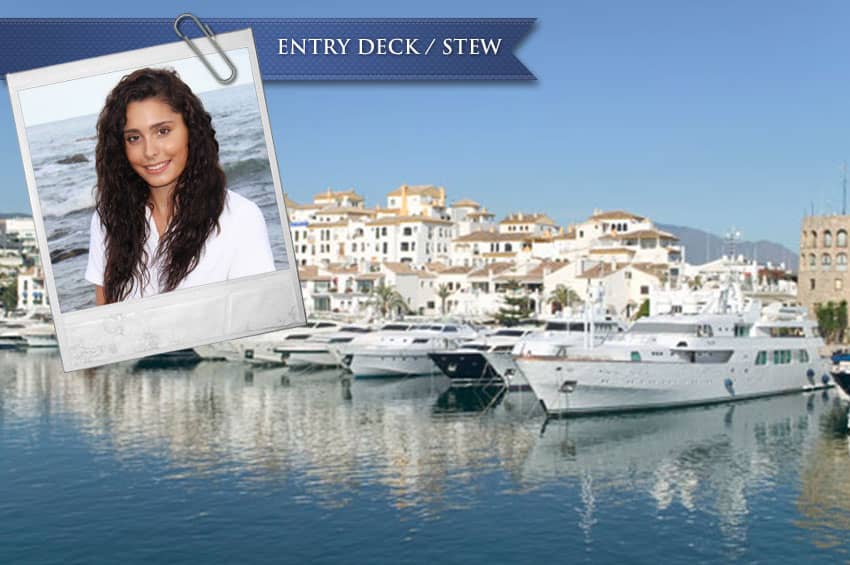
A Day in the Life Of Series - Entry Stewardess
Joining the yachting industry is an exciting and daunting undertaking. In this two part interview we speak with Melanie about why she decided to join the superyacht industry, what her hopes and goals are, and what she has learnt so far as an entry level stewardess.
29 Nov 2017
- Yotspot Connect
- Advertise with us
Extra Reading
- Success Stories
- Mental Health
- Seafarer Employment Agreements
- How to get into Yachting 'The Handbook'
Our Partners
- Join the PYA
- Financial Services
- Yacht Brokerage
- Find an ENG1 Doctor
Need Help? Contact our support team
- X / Twitter

Join Yotspot
Advertise your maritime positions with Yotspot, the leading jobs board in the yachting industry. Connect with top candidates for super yacht and shore-based roles. Kickstart your career with Yotspot's extensive job listings, career training, and industry connections to help you chart your professional path.
The Yacht Account
Are you looking for professional yacht crew? Join and gain unrestricted access to our entire crew database with unlimited postings for Captains, Deckhands Stewardesses and much more...
Sign up free Find out more
The Shorebased Account
Are you looking for yachting industry professionals? Join and gain unrestricted access to our entire database of industry professionals with unlimited postings for Yacht Brokers, Managers, Designers and much more...
The Jobseeker Account
Are you looking for jobs or opportunties within the yachting industry? Join and access advanced features to assist your job-hunting journey as well as exclusive discounts, deals and benefits...
The Training Account
Are you a maritime training provider looking to advertise your course? Join and advertise your maritime training courses including dates & availability to maritime professionals who need them...
How to get a job on a superyacht without any experience?

Check out Yotspot’s 5 Step Plan.
We’ve all got to start somewhere. Superyachts do take on people with no prior experience, you’ve just got to be willing to work hard, work long hours, keep smiling, be polite and agree to take on an entry-level job, so you can learn on the job. Positions like; stewardess, steward, cook or junior deckhand. All jobs currently listed on our Yotspot jobs board today.
It’s an incredibly popular industry to work in, especially for ambitious individuals; flexible enough to travel, keen to gain experience and eager to see the world.
So, let’s get started…
- Hop on the Yotspot jobs page, walk the docks or visit local agents
- Polish and perfect your CV/resume (the Yotspot team are on hand to help if you need it)
- Sign up FREE as a Yotspot member
- Complete your basic STCW
- Build a bank of references with day work
- Search for positions through us:
- Superyachts (motor and sail)
- Sailing Yachts
- Commercial Vessels
- Research Vessels
- Yacht Build and Refits
- Yacht Management
- Yacht Sales, Charter, Brokerage and more…
Step 1 – what transferable skills have you got?
Jot down your skills and experience that complement the job you’re applying for. Think about what might be useful on board the yacht. Experience and training in the hospitality industry EG: cruise ship, restaurant, hotel, private household or resort is definitely a bonus. Plus, if you’ve got specialist skills or training; engineer, yoga instructor, nanny, masseuse or helicopter pilot you’ll be an even more valuable recruit to the captain and his crew.
Step 2 – a “can do” attitude to learning
The captain will be looking for an eagerness to work hard and a “team player” – someone who fits in well with the existing crew, someone flexible, willing to go the extra mile and interested in self-improvement.
Step 3 – Be ready for work at a moment’s notice
The world of yachting follows a seasonal pattern, so it pays to base yourself nearby if you can.
The European circuit runs from May to September, mainly in Antibes, South of France, and the Americas/Caribbean from early winter and early spring, mostly out of Fort Lauderdale.
Being available for day work, shadowing crew, helping out, getting whatever experience you can, hanging around bars where crew hang out, networking, visiting local agents and being available to attend in-person interviews will help.
While you are job hunting, keep your living arrangements as flexible as possible, so you can say “yes” to work at a moment’s notice. It may take time though, so make sure you’ve got enough money to support yourself for a couple of months.
Step 4 – Make sure your CV is top notch
This is your first impression so make sure it’s a good one! Include a good, clear photo – check out our tips for getting your profile photo right ! Get someone to check your CV for typos and grammatical errors – mistakes look sloppy! Again, our friendly team are on hand to help.
Make sure you include relevant experience, with the most recent first and those valuable transferable skills. Education, prior job experience, training and any industry knowledge will make your CV stand out. Potential employers like to see hobbies, interests and additional skills, like flower arranging, proficient languages etc. Anything that makes you stand out as a candidate and gives you that additional edge. References are really important, make sure you ask previous employers if they’d mind being your referee.
Step 5 – Complete your basic training
Mandatory training, and the minimum requirement, for anyone working on yachts that charter is the basic STCW – Standards of Training, Certification and Watchkeeping.
The STCW takes about a week to complete and comprises four modules:
1) fire prevention and firefighting
2) personal survival techniques
3) personal safety and social responsibility
4) first aid/CPR.
Once completed, you’re awarded a certification which is valid for five years. Although some modules don’t expire – check with your maritime school.
Working in the yachting industry requires a strong work ethic, stamina and a positive mental attitude. And if you’re willing to put in the effort, the rewards can be amazing.
If you haven’t already, register with Yotspot today and select from hundreds of jobs with yachts, agencies and management companies with one click, one profile and from one central location. Your ideal job could be there waiting for you!

Keep up to date with Smart Move
How To Work On A Superyacht, With No Experience in 2020
Posted on: 06/23/2020

Article Written By Meg Tonkin of Get Onboard Superyacht Academy in Cape Town. June 22 2020
With over 12 years in the industry, interviewing and hiring countless candidates across various positions, we know first hand al the information you require in order get your first real crew job on a superyacht.
In this post we highlight some of the features of our "Beginners Guide to Yachting" Ebook which explains all you need to know from how to get your CV yacht perfect, typical daily stewardess or deckhand duties, how to find day work and more.
What is an entry level position for my first job on a yacht? The two most common entry level positions on yachts are stewardess jobs and deckhand jobs. These are both junior ranks whose primary concern is to keep the guests happy and ensure the interior and exterior are kept immaculately clean.
You can also apply for specialist roles such as a superyacht engineer and chef jobs, however these may require some previous experience or qualification.
What qualifications do I need to work on a yacht? What are the basic elements you need to be eligible to work in the yachting industry: · STCW’10 · ENG 1 What is the STCW Course?
STCW stands for Standards of Training, Certification and Watchkeeping. The STCW'2010, previously referred to as STCW'95, is a compulsory requirement for any seafarer in order to be eligible for employment at sea. If you are planning on joining the Superyacht industry to look for a yacht job as a stewardess, deckhand, engineer or chef, you will need to complete this STCW course. This course covers personal survival techniques, fire safety and fighting, first aid, social responsibility and security awareness.
What is the ENG1 medical certificate?
The ENG1 Medical is a basic medical certificate and is as essential as your STCW'10. It is a mandatory requirement to prove you are fit to work as a yacht crew member at sea. Only MCA-approved doctors can perform an ENG 1 medical exam.
Where can you complete your training?
Get Onboard Superyacht Academy offers complete STCW and ENG1 training in Cape Town, South Africa.
With over 14 years industry experience, our maritime partners internationally accredited maritime partners who are ITY and MCA certified ,were carefully selected to ensure our candidates are provided the best possible training experience with top notch facilities in order to ensure they begin their super yachting career with a competitive edge. Read our article on how to choose a training school for more information.
Do I need any other courses?
While the STCW and ENG1 are the only compulsory courses that you need to complete in eligible to work at sea, there are various other courses you can complete that will greatly enhance your CV. These include deck modules like, Powerboat Level 2, Yacht Rating certificate, Jetski licence, Stewardess training which includes flower arranging, barista training, wine pairing and basic housekeeping skills.
What previous experience is useful when looking for a job on a yacht? While working on a yacht is certainly different to any land based career, there are various land based positions that offer you skills that will be beneficial to working on yachts. Any job that involves hospitality training, bartending, working as a server in a high end restaurant, beauty therapy, child care or au pairing, food safety, flower arranging are highly beneficial as well as carpentry, work sports instructor, dive master or anything else yacht related. If you have already completed some form or degree or diploma in engineering or mechanics, this is also considered a huge plus. Have a look at our article on other skills that can benefit you onboard for a more detailed explanation.
How do I get my first job on a yacht? Once you are qualified, what are the next steps to finding your first job onboard?
How do I make a Yacht CV?
Yacht CV's are very different to landbased CV's and are essential when looking for a job on a yacht. Read our guide on what Captains Look For in A CV for more information.
What is Daywork?
Day work is a great way of networking, building contacts in the industry, and most importantly finding you first superyacht job. Day work refers to when you do not have a formal contract in place with a yacht, but you help out onboard for anything from a day to several weeks. Day working is a great way for you to get a sense of different roles onboard and whether the industry is right for you. Often the Captain or senior crew member will use day work as a trial or "audition" to see who is the best fit for the crew and is the most efficient worker so it is an excellent tool to use when searching for your first job.
What are the best locations to get a yacht job?
There are two main yachting hubs, the Mediterranean, particularly Antibes in France or Palma de Mallorca in Spain, and Fort Lauderdale or Miami in Florida. We explain the different seasons and best time of year to visit each areas in our article Best Locations To Get a Yacht Job for Time of Year
How much money do you make working on a yacht? Yacht salaries will vary between position, depending on your experience and even from boat for boat. Entry level positions may pay similar to land-based industries, however there are certain additional benefits to yachting that will make the salary more attractive. Once you are employed onboard, you have very little living expenses as your food, basic toiletries, insurance and uniform are all covered by the yacht.
How much can a stewardess or deckhand earn?
The standard entry level salary for a junior stewardess or deckhand ranges between €2000-€2500 or $2300-$2800 per month. This amount is generally tax free, although the onus is on each crew member to check with their home county about tax obligations. Certain countries are tax exempt provided you spend more than 6 months out of the county.
What is it like working onboard a superyacht? While the yachting industry has many perks, it certainly isn't for everyone. Often you are required to spend long periods away from friends and family as well as working long hours living in a shared work environment. Take a look at our article to learn the truth about yacht crew life and see if working on a yacht is really for you.
Do you still have some unanswered questions? Why not download our eBook and find out all the insider tips of surviving, and preparing for yacht crew life, or contact the Get Onboard team. Please use discount coupn code at check-out " SMARTMOVE" for a special discount!
https://get-onboard.com/blogs/yacht-info/how-to-work-on-a-superyacht-with-no-experience
How to Find A Yacht Job Without Experience

This article may contain affiliate links, meaning I make a small commission on any purchases at no extra expense to you. Read our disclaimer & privacy policy here.
Thanks to my job as a yacht stewardess, I’ve been able to live in and explore some of the most beautiful and remote spots in the world. Some of those places can only be reached by water and only a small percentage of the population will ever get to see them. But, none of this comes easy. Working in the yacht industry takes hard work and dedication but comes with some massive payoffs.
If you're interested in other travel jobs in hospitality, look into becoming an overland tour guide . As a guide, you'll take groups of travelers across continents via land travel for months on end. Another option to travel by sea is to work on a cruise ship .

Requirements to Get Hired as a Yacht Stewardess
- STCW10 (Basic Safety Training)
- ENG1 Medical
- Hospitality Experience (Good to have but not necessarily a deal breaker)
I worked on the private islands in the Whitsundays Queensland Australia for over 4 years. I started out as personal trainer on the fitness club then cross trained into front office reservations, housekeeping, and food and beverage. I’ve also done hostess work on luxury boat transfers.
All of this accumulates to 11 years in the industry and a keen insight to what boats are looking for in their crew.
The job possibilities on a superyacht are diverse. Since a boat is it’s own independent entity, they need everyone from laundry to engineers, deck crew to yacht stewardesses, personal trainers to chefs and just about anything in between. Depending on the size of the yacht, you could be expected to balance many roles or do one specific thing each day. Generally, a bigger yacht will have the budget to hire more specialized crew, where a small yacht will be searching for a few jack of all trades.
Rather work in a hotel, resort or restaurant abroad? Learn how to best utilize LinkedIn to find hospitality jobs abroad!
In addition to the requirements, when I hire, I look for some specific qualities in candidates:
- You must be a hard worker
- No bullshit attitude and no drama
- Ready to take on tasks you may not want to be doing
- Be a good listener
- Have an incredible eye for detail
- Be respectful of others. Remember you all work, eat and play together day in and day out
- Be willing to be at sea and away from family and friends for weeks and maybe months at a time
- Be committed. No one likes a crew member who doesn't contribute 100%
- Bonus: Have experience in high-end hotel operations or hospitality
In interviews, you have every right to ask as many questions as you want. It doesn’t just have to be right for the employer but for you too! Don't be afraid.
We’re not a regular travel blog; we’re a collection of women living around the world, all with different backgrounds, jobs, desires, & nationalities. What do we have in common? A passion for life abroad. Each article is written from the 1st-hand perspective of a woman who has actually done or experienced what she writes about. Learn more about the author by clicking her bio pic at the start or end of each article.
Dream of moving abroad but need a helping hand? I got you. This e-book isn't a regular book, it's also a workbook geared to helping you make some big decisions regarding the life abroad you want to build. Everyone's way abroad is different. This book is all about helping you find yours.

Steps to get hired as a "Green Stew" on a mega yacht
To reduce the information overload, I’ll focus on yacht stewardess roles, specifically for newcomers to the industry.
Currently I’m a chief stewardess on a private mega yacht. Meaning I’m in charge of everything that happens in the realm of service and housekeeping. Working on a yacht also means living on a yacht so another part of my job is keeping my team energized and working well together throughout the season.
Everyone who is new in the industry is known as a “green stew.” Most of the people I hire are at least 20 years old but I’ve known people as young as 18 to get hired. So long as you have you STCW10 and ENG1 Medical, any other type of training is not mandatory.
If I’m looking for a green stew she just has to have the right attitude and a great work ethic and we will train her to fit her role.
Steps to get hired (details below):
- Make sure you have the qualifications (STCW10 & ENG1 Medical)
- Make a Yachting CV
- Add any additional certificates you can
- Be willing to interview in person
Step 1. Check Off the Qualifications
The most important pre-req to getting hired on a yacht is having all of the right qualifications. There's really no wiggle room here as it'd be illegal for us to employ a staff that isn't well-versed in safety measures at sea or have the physical health deemed necessary to work at times far away from any medical staff.
Keep in mind, there is a very small amount of doctors in the world that are able to provide the ENG1 Medical exam. This is the list of doctors worldwide who are capable of giving you this health check.
I recommend first taking care of this health check and then chasing your STCW10. You'll have a lot more options as to where you can complete this basic safety training, namely at popular port towns. It might be more expensive here but it will be helpful to start job hunting while you're taking this course.
Step 2. Perfect Your Yachting CV
A Yachting CV is like any normal CV however very professional and short and sweet. Your CV must be only 1 page so it’s important to use that space wisely.
This is the format you'll want to use:
- Start with a personal paragraph, like a cover letter but much, much shorter.
- Highlight your personal information, local contact information and even things like visible tattoos and piercings.
- You must include a headshot. It’s best if the picture is high quality, you wear a collared shirt, your hair is out of your face and you have minimal makeup on. It’s best that the captain or chief stew can imagine what you’ll look like on their boat easily.
The yacht world is very professional and has a keen eye to detail, so your CV should represent that.
Step 3. Add Any Additional Certificates or Trainings
There are so many additional certificates you can add on your CV to make yourself extra competitive but again, these are more important for a management role or if you’re aiming to work in something specific, like the spa.
Once you arrive to the port town and start your job hunt, you'll realize there are a lot of special courses you can take to make yourself stand out, like a mixology course. I only recommend doing this if you're having a really tough time getting hired or you don't have much more hospitality experience to back you up.
Step 4. Interview In-Person
A majority of green stews will need to interview for jobs in person. It’s best to be able to visit your potential new workplace so you both can get a feel for everything. This will also help you to even get interviews as a common way to get hired to "walk the docks." This simply means printing out a handful of CVs and going yacht to yacht dropping them off.
I have been offered many jobs via Skype interviews and have been flown from the other side of the globe but this is mainly because I have years of experience backing me up.

The Yachting Seasons
Based on location, the season can change. A yachting season is when it's the most popular time to sail that area. This is based primarily on weather and the sea. There are of course exceptions to this rule but in general, if you follow the seasons, you'll have the best shot at getting hired.
In Europe & the Mediterranean
The yacht season is May-September but hiring can start in April. A big hub for job hunting is Antibes, France. It’s possible to even get your requirements done here while you start learning first hand about the industry, although it can be more costly than other places.
In the U.S.
The Northeast follows the same season as Europe & the Med. The season here will run May-Sept. This can be a great opportunity for U.S nationals and those with relevant visas. A hub for hiring here is Newport, Rhode Island.
In the Caribbean
If you’re looking to get started later in the year, you can head down to Florida to get a job for the Caribbean season. This season is around October-April. Most people head to Ft. Lauderdale or Miami for job opportunities.
If you don’t have a U.S visa or passport, it might be best to get hired in Europe and hop on a boat doing a crossing (Med to Atlantic Ocean) between seasons. If you’re a great member of the team, they’ll help get your visas sorted.
In the South Pacific
It’s also possible to get hired in the South Pacific also but it’s not as common. It’s best to look for crew positions in Fiji in August-October. But if you find yourself in a big harbor town, ask around. You could be pleasantly surprised!
Although there are opportunities across the globe, getting a job on a super yacht is very competitive. It’s a great lifestyle for the right person and a lot of people are looking to join the industry.

Perks to Working as a Yacht Stewardess
There are amazing perks to working on a yacht once you find a stewardess job. If this is your dream job , or even just something you want to try out, go for it!
All meals, accommodation, and toiletries are provided for you. Most of the time you will live and work within the confines of the yacht. Most crews are lovely so just be yourself and make some wonderful friends.
Plus, you’ll get to travel to some incredible places. All boats are different with their time off though, so how much time you’ll get off to enjoy the scenery depends.
Because everyone is together 24/7, people can get stir crazy.
Always speak up if you feel something isn't right but at the same time don’t bitch. It gets you nowhere and ruins a good team. If you have a problem speak up! Don't bottle it up and become miserable.
Your captain and chief stew should always be supportive of you. But at the same time, you should always be respectful and mindful of them and the rest of the crew at all times. Respect the entire boat and other peoples working environments. If you want to work your way up the ranks you need to put in the hard yards and trust me it will pay off.
The yacht life isn’t for everyone but for the right person, it’s amazing.
A lot of people in the industry work hard for half a year, save up and spend the other half resting and enjoying a nice, long vacation wherever in the world they prefer. It's a great job for someone looking to be able to afford 6 months of travel just from 6 months of work!
Read our disclaimer & privacy policy here .
A lot of effort went into making this amazing piece of journalistic genius. If it helped you out, send us a quick thanks by buying us a coffee. All the money donated through Ko-Fi goes towards keeping A Way Abroad awesome. Big thanks!

The ultimate resource for women dreaming of a life abroad.
.png)
How to Move Abroad
Dream of moving abroad but have some hurdles in your way? Whether it's the fear, logistics, or not knowing where to even start, I've got you. This isn't a regular book, it's also a workbook designed to help you make some big decisions to get yourself set up for a successful life abroad. Everyone's way abroad is different. Let's find yours.
.png)

- Search our database of 89,375 crew
- Free registration
- Free job advertising
Crew Search Post a Job
- Apply for 1,016 yacht jobs
- All jobs manually checked and approved by us
- Your details secure and protected
Crew Registration Search Jobs
Featured Yacht Jobs
- Deckhand/Stewardess
- Temp 2nd Stewardess- 60m Private MY – Western Australia
- Rotational Chief stewardess
- Temporary Chief Stewardess (strong 2nd Stew)- 50m shipyard period
- Sole Chef-Private, 53m
- Experienced Stewardess for a 32m Private Charter MY
- Deckhand/Carpenter
- 3rd Officer
- View all jobs
Browse Yacht Jobs
- Deck Jobs (328)
- Engineering Jobs (139)
- Galley Jobs (121)
- Interior Jobs (338)
- Specialist Jobs (54)
- Shore Based Jobs (131)
- Other Jobs (14)
Find STCW Courses:
Powered by STCW Direct
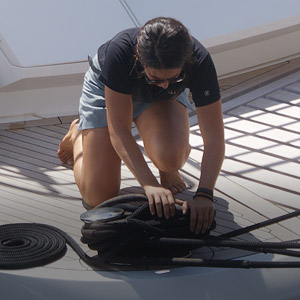
Our crew database includes 5,133 Captains, 10,037 Deckhands, 2,947 Chief Engineers, 1,313 ETOs, 5,570 Chefs, 15,180 Stews, 1,469 Massage Therapists, etc. Here are some of the recently registered yacht crew members:

Email address:
Remember me Forgotten password?
Password Reset
Enter your email address and we will email you a password reset link.
Email address:
- Our Campaigns
Get Involved
Popular Searches
- IUU fishing
Volunteer for our Global Campaigns at Sea
Ready to join Neptune's Navy? Sea Shepherd Global welcomes passionate individuals to crew aboard our global fleet of four ships. We're looking for people of all ages, backgrounds and skills who are ready for the adventure of a lifetime as they defend and protect the world’s oceans.
Neptune's Navy Needs You
We are looking for passionate ocean defenders who aren’t afraid of hard work, no pay, long hours, dangerous conditions and extreme weather. We need volunteers motivated by the fight to defend, conserve and protect our seas and marine wildlife from the many threats facing them today. Sea Shepherd operates on very limited resources, most of them going directly to maintain and operate our fleet. Our volunteer crew members are key to the success of our direct-action campaigns!
Sea Shepherd’s fleet is crewed by volunteers of all backgrounds from over two dozen countries and five continents. While the average age is 30, volunteers range in age from 19 to 61 years old, though we have no upper age limits to join our crew. Women make up almost half of our ships’ crew, including captains, marine engineers and officers. While preference is given to technically-skilled volunteers for positions such as marine engineers, navigators, radio operators, cooks and medics, we also need deckhands to keep the ship running smoothly. Previous experience working on board a ship is not required if you’re willing to learn new skills!
To be eligible, you must meet the following requirements:
- You must be a minimum of 18 years old.
- You must know how to swim.
- You must comply with the Sea Shepherd “zero tolerance” drug policy and smoking rules.
- You are financially responsible for travel to and from the ship and all personal items.
- You must agree to be filmed/photographed while on campaign.
The Benefits In addition to adventure, fulfillment, new friends, and the experience of a lifetime doing the hardest work you’ll ever love, all Sea Shepherd crew are given full room (bunk and bedding) and board (three hearty vegan meals a day), as well as onboard training by veteran crewmembers.
Positions Available There are six primary areas on our ships: Bridge, Deck, Engine Room, Galley, Communications and Media. We are looking for navigators, sailors, marine engineers, mechanics, electricians, carpenters, welders, cooks, doctors, medics or nurses, small boat operators, photographers, videographers, computer and networking specialists, electronics hobbyists and experts, software developers, radio and antenna technicians, and even a few unskilled dedicated Ocean Defenders who are willing to be trained. If you are a ticketed navigator or marine engineer, please feel free to send your CV here .
Timeframe Sea Shepherd’s campaigns take place throughout the year and rarely last less than a month, with many lasting up to four months or more. Preference is given to volunteers who are available for the most time. For new crewmembers with no specialized skills we look for a commitment of three months, where you’ll often be working on a ship while in port before qualifying for a sea campaign. Crew with specialized skills can usually join sea campaigns directly.
Locations Our campaigns take place in oceans around the world, including the Antarctic, Africa, Europe and the Americas. Transportation to and from the ship is the responsibility of each volunteer.
Questions? Check out the FAQs before contacting our Crew Coordinator here .
August jobs report shows job losses for US-born workers, gains for foreign-born
Us economy added 142,000 jobs in august.
A U.S. jobs report shows 142,000 jobs were added in August; this comes two weeks before a key Federal Reserve meeting to set interest rates. Jason Sorens, a senior research fellow at the American Institute for Economic Research joins LiveNOW's Andrew Craft to help us make sense of this.
LOS ANGELES - The latest data from the Bureau of Labor Statistics shows a significant divergence in employment trends between native-born Americans and foreign-born workers over the past 12 months.
According to the August jobs report , reported by FOX Business, U.S.-born workers lost more than 1.3 million jobs, while foreign-born workers gained over 1.2 million jobs during the same period.
READ MORE: US economy adds 142,000 jobs as unemployment rate falls slightly, Dept. of Labor reports
As of August, there are 129.7 million native-born workers, down from 131 million in August 2023. In contrast, foreign-born workers saw their employment numbers rise to 31.6 million from 30.4 million a year ago. These figures highlight the contrasting employment paths for these two groups.
Immigration and job trends
The jobs report comes amid a period of increased immigration under the Biden-Harris administration. Data from the Congressional Budget Office (CBO) reveals that more than 9 million immigrants have entered the U.S. since the end of 2020, with about 2.6 million entering through lawful channels. The remaining 6.5 million are individuals who crossed the border without prior authorization.
The jobs report does not distinguish between foreign-born workers who entered the U.S. legally and those without authorization. However, the surge in foreign-born workers gaining jobs underscores their growing presence in the workforce.
Job growth in August misses expectations
U.S. job growth picked up in August but failed to meet economists’ expectations. Employers added 142,000 jobs, short of the 160,000 projected by LSEG economists. The unemployment rate dipped slightly to 4.2%, after rising unexpectedly to 4.3% in July, the highest rate since October 2021.
Notably, multiple jobholders increased by 65,000, and the number of part-time workers surged by 527,000, while full-time workers saw a decline of 438,000. Sectors like construction saw gains, adding 34,000 jobs, while health care added 31,000 jobs, lower than its 12-month average.
Biden's border policies in direct conflict?
President Biden toughened his stance on border security after immigration has emerged as top issue. Biden also announced a legalization program for immigrants who are married to U.S. Citizens. LiveNOW from FOX's Stephanie Coueignoux spoke with Former Supervisory Special Agent with ICE, Victor Avila, to discuss the latest.
Economic implications of shifting job numbers
The shift in employment for U.S.-born and foreign-born workers raises questions about the broader economic implications. The significant job gains among foreign-born workers, paired with job losses for U.S.-born individuals, could fuel ongoing debates about immigration policies and their impact on the labor market. Meanwhile, the modest job growth and revision of previous months’ data signal continued challenges in the U.S. labor market.
As the economy continues to navigate these dynamics, the trends in employment among different demographic groups will likely play a crucial role in shaping policy decisions.
This article is based on data from the Bureau of Labor Statistics and additional insights from the Congressional Budget Office, combined with reporting from FOX Business on the August jobs report and its implications for U.S. and foreign-born workers.

IMAGES
VIDEO
COMMENTS
Yes. You will need an STCW 10 certificate to understand basic safety protocols, as well as an ENG1 Medical Certificate to prove that your health is in good enough shape to join a vessel. Get Onboard Superyacht Academy offers complete STCW and ENG1 training in Cape Town, South Africa. These are the only compulsory documents needed, but if you ...
2. Get all the qualifications in one place. Take our Deckhand or Steward/ess Courses; both provide all the qualifications (minus the ENG1 medical). These types of courses are an invaluable part of how to get into yachting, and even more important to getting yacht jobs with no experience.
Stew / Cook - 44m Private Motor Yacht. Med. Permanent. Qualifications: STCW, ENG1, Food & Hygiene Level 2, Culinary Trained. Experience: 1 Season +. Salary: 3500EUR (DOE) Apply. Next →. The latest yacht crew jobs available onboard exclusive charter yachts and luxury private yachts with leading yacht crew recruitment company, Bluewater.
Swan Point Yacht & CC. Swan Point, MD 20645. $18 - $19 an hour. Part-time. 20 to 25 hours per week. Monday to Friday + 2. Easily apply. 1-year applicable custodial experience preferred but not required. Performs a variety of cleaning / housekeeping tasks within the clubhouse and two guest houses….
2. Create a Resume. Create a Resume. A resume is necessary to find a yacht job even if your past work experience has nothing to do with yachts. The personal paragraph is one of the most important parts of a resume for a yacht job. Make sure to keep it short and sweet while highlighting why you want to work on a yacht.
While some of the job positions onboard are very technical and require a lot of skill and knowledge, there are 4 entry-level jobs that require little to no prior experience. The most common entry-level jobs on a yacht are some variation of: 1. Yacht Stewardess / Steward. 2.
Yachts do hire people with no experience in yachting. The entry-level positions which offer new crew the best opportunity to learn the "ropes" in yachting are: junior deckhand, stewardess, steward, or cook. The key to finding your first position onboard is preparation. There is a lot of competition for the rookie jobs on yachts.
Apply to Recruitment Agencies. Register with yacht crew recruitment agencies to increase your chances of finding a job. They often have access to exclusive job openings and can connect you with potential employers. Be sure to maintain a strong relationship with your recruitment agent and update them on your progress.
Step 2 - a "can do" attitude to learning. The captain will be looking for an eagerness to work hard and a "team player" - someone who fits in well with the existing crew, someone flexible, willing to go the extra mile and interested in self-improvement. Step 3 - Be ready for work at a moment's notice.
Article Written By Meg Tonkin of Get Onboard Superyacht Academy in Cape Town. June 22 2020 . With over 12 years in the industry, interviewing and hiring countless candidates across various positions, we know first hand al the information you require in order get your first real crew job on a superyacht.
I recommend first taking care of this health check and then chasing your STCW10. You'll have a lot more options as to where you can complete this basic safety training, namely at popular port towns. It might be more expensive here but it will be helpful to start job hunting while you're taking this course. . Step 2.
Here are some yacht crew jobs that require no experience: If you're interested in working on a yacht but don't have any experience in the industry, you might be wondering what types of jobs are available. While many yacht crew positions do require some level of experience or training, there are also several entry-level jobs that can be a great ...
Prepare thoughtful questions about the yacht and the role to show your interest. Conclusion. Landing a deckhand yacht job without prior experience is entirely possible. By following the steps outlined in this guide, you can set sail on a new career path and embark on exciting adventures across the seas. FAQs
Getting started as a green yacht crew member may seem like a daunting task. You've seen all the exciting videos of yacht crew living and working on board the...
There are PLENTY of things you can do that will help you land your first job on a yacht with NO prior experience: Register to do your STCW training course either at a place near you or at a Yachting hub right before the season kicks off. Book your ENG1 Medical Test. Stay in a crew house.
Typically responds within 1 day. $20.56 - $32.00 an hour. Full-time. 40 hours per week. Monday to Friday + 1. Easily apply. The ideal candidate will have basic marine experience and general mechanical experience or be willing to obtain knowledge in Yacht Rigging. Active 4 days ago.
Our crew database includes 5,133 Captains, 10,037 Deckhands, 2,947 Chief Engineers, 1,313 ETOs, 5,570 Chefs, 15,180 Stews, 1,469 Massage Therapists, etc. Here are some of the recently registered yacht crew members: Hundreds of live jobs on yachts and superyachts. Jobs for yacht crew in the Mediterranean, Caribbean, USA and other locations.
Sales and Account Representative. Liquid Yacht Wear. Fort Lauderdale, FL 33316. $50,000 - $65,000 a year. Full-time. Monday to Friday + 1. Easily apply. Past experience in yachting industry a plus. We carry our own line of specialize crew uniform and can bring in any styles through special relationships with our….
Sea Shepherd's fleet is crewed by volunteers of all backgrounds from over two dozen countries and five continents. While the average age is 30, volunteers range in age from 19 to 61 years old, though we have no upper age limits to join our crew. Women make up almost half of our ships' crew, including captains, marine engineers and officers.
The only truly independent, international but yet boutique brokerage company, Bluewater is looking for a charter broker and a sales broker in Antibes, to complement its other brokerage teams in Palma, Moscow, Miami, Switzerland and Hong Kong. The successful candidates need to have solid and proven experience of yacht brokerage and charter of vessels over 24m.
No, Return to Jobs. Kroger - Front End Lead/Cashier $16-$35/hr. Kroger Moscow, ID (Onsite) Full-Time. Apply on company site. Job Details. No experience requited, hiring immediately, appy now.You will be responsible to assist the service operations manager with supervision of Front End (FE) policies and procedures, cashier performance, labor ...
13 Luxury Yacht jobs available in ]remote on Indeed.com. Apply to Yacht Broker, Sales Representative, Account Executive and more!
Post your jobs for free. Search best resume for free. Fast and easy to search, share and post CVs, job ads. Administration of the site is not responsible for ads. MoscowJob.Net — Jobs in Moscow and Moscow region. Phone: +7 (977)787-7020. Find a job or find the best candidates in Moscow.
The August jobs report reveals a sharp contrast in the U.S. job market, with US-born workers losing over 1.3 million jobs in the past year, while foreign-born workers gained more than 1.2 million ...